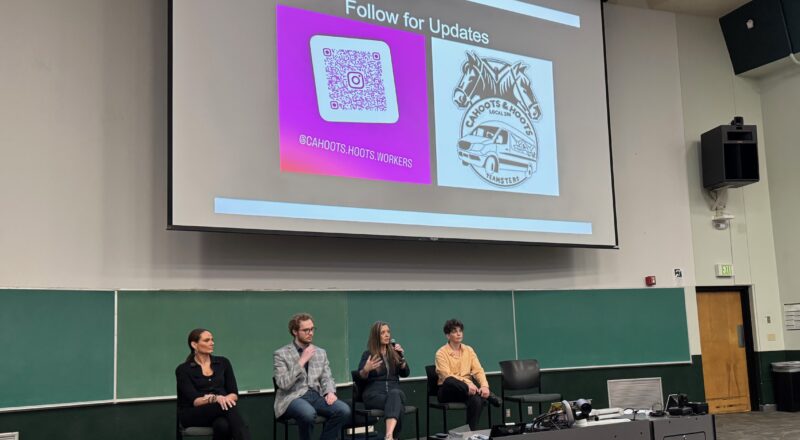Less than a week after the layoff of over twenty workers and the end of 35 years of CAHOOTS service in Eugene, panelists at a UO town hall said the crisis response team was exploring a separation from White Bird Clinic. Thursday April 10, a town hall hosted by the UO Department of Sociology pivoted from a research and community impact discussion to a forum of community frustration and ire over the program’s collapse.
CAHOOTS workers made a call to action for the people of Eugene to show up for each other while the team is unable to respond in the community. While CAHOOTS services are available for half the day in Springfield, Lane County’s new mobile crisis services only respond to a limited range of calls. This narrowing of the crisis response mission has been an ongoing issue since the county mandated restricted access to calls from emergency dispatch in August 2024.
Despite pushbacks from police and a variety of behavioral health professionals, by October CAHOOTS workers were prohibited from responding to behavioral health calls during Mobile Crisis Services of Lane County (MCS-LC) operating hours. Confoundingly, after the MCS-LC hours of operation, no restrictions were imposed on CAHOOTS’ call response.
“The team was devastated to be sitting in the van listening to calls they couldn’t take, and the police had to respond to,” said a CAHOOTS worker.
As the restrictions unfolded workers found the MCS-LC would take an average of five calls a day, compared to a pre-restrictions volume of forty-six calls CAHOOTS would respond to daily.
What became apparent was that the MCS-LC restrictions were built around Behavioral Health Medicaid billable services. With the county able to bill Medicaid $400/hour for mental health services, CAHOOTS’ hourly operating budget of $120/hour and its vastly wider range of services could put a significant dent into the county’s funding stream.
At a meeting last year with the Oregon Health Authority, Lane County officials admitted exactly that when saying, “We can’t count the volume of calls you (CAHOOTS) take towards our funding stream.” In other meetings attempting to get the mandated restrictions withdrawn, representatives from CAHOOTS were not included, and team member input was limited to public comment.
“We got nuked, the rules were written for billing purposes,” said one CAHOOTS employee.
Even Eugene’s Community Safety Payroll Tax, which was largely sold to the public using CAHOOTS’ name, has failed to deliver the funding it promised. With 40% of their budget lost after Eugene dropped their contract and a turf war with MCS-LC, the team has found little support from White Bird since workers unionized in 2024.
Several CAHOOTS workers have expressed that a separation agreement is in order with White Bird Clinic. Some workers reminisce about how CAHOOTS was at one time a collective and have slowly seen the corporate structure that WhiteBird adopted strip much of that away. There is a precedent for organizations separating from White Bird and ongoing efforts to establish a memorandum of understanding with the county.
There is now a greater urgency for CAHOOTS to seek a Non-Community Mental Health Professional (CMHP) certification. Such a certification would help push back on some of the restrictions the county has imposed and have helped other non-CMHP organizations like Western Lane and Riverview Center of Development & Growth. Both of which are helping CAHOOTS develop a path to non-CMHP certification.
Ultimately this could facilitate CAHOOTS gaining access to some of the funding streams available through the federal legislation which bears the organization’s namesake, the CAHOOTS act sponsored by Sen. Ron Wyden. Employees have also said the Oregon Health Authority has been “nothing but gracious,” in helping facilitate a place for CAHOOTS in the community health landscape.
How White Bird managed to drop the ball for so long has been an ongoing saga that first openly made light in 2020 when the nonprofit fired CAHOOTS workers for supporting the George Floyde protests. Since then, expanding budget cuts and policy changes have increased the divide between White Bird management and its CAHOOTS workers.
What seems most concerning for an expansive and highly paid non-profit board is its ongoing failure to capitalize on CAHOOTS’ near legendary national notoriety. With the CAHOOTS program continually cited as a radically successful alternative for mental health crisis response, there have been very meager attempts by White Bird’s board to expand consultation or education about the program.
CAHOOTS workers themselves have largely taken consultation and professional development into their own hands even before 2020. On a national level workers have been building relationships at various conferences and classrooms. Workers often participate in the Crisis Intervention Team (CIT) International conference, where their de-escalation training is taught to dispatchers and police departments across the country. All this despite the gatekeeping that White Bird holds over CAHOOTS’ professional and email communications.
How CAHOOTS’ will separate from White Bird, has yet to unfold. What has emerged this week is that due to the disorder of White Bird’s management, the nonprofit has failed to complete a costly copyright of CAHOOTS’ name and logo. This bodes well for the organization’s amicable separation from its parent nonprofit and workers have expressed their eagerness to work with the city to build a stronger crisis response service.
Discover more from Solidarity News
Subscribe to get the latest posts sent to your email.
